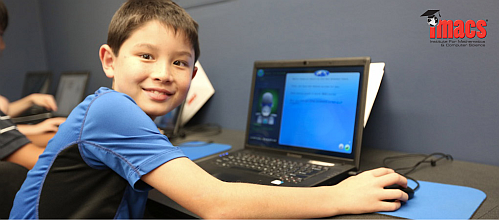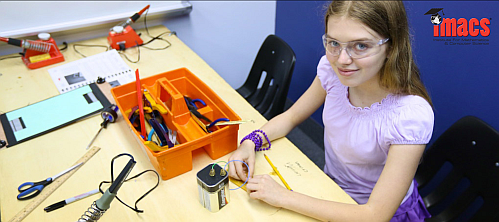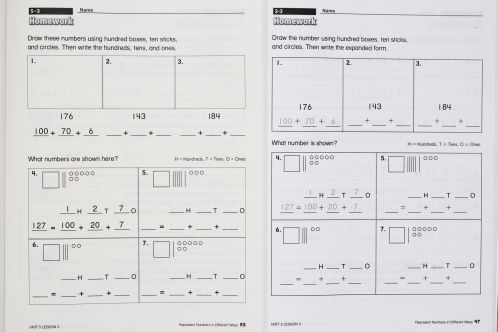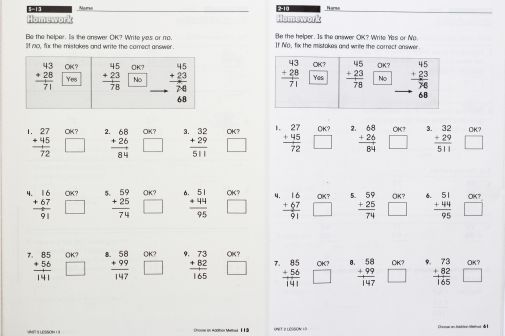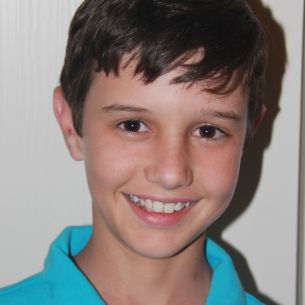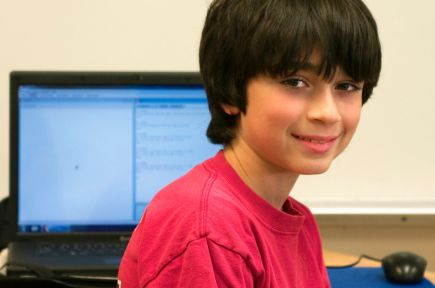
Homeschooling is growing in the United States, having shifted from the "fringe" toward the mainstream. In January 2014, the National Home Education Research Institute (NHERI) estimated that there were 2.2 million1 K-12 home-educated students in the US, up from an estimated 1.5 million2 in 2007. According to the NHERI, one of the most common reasons that families choose homeschooling is to "customize or individualize the curriculum and learning environment for each child." Not surprisingly, families with gifted children make up a significant part of the current homeschool movement.
If you thought that homeschooling meant having to teach your child all subjects on your own while sitting together at the kitchen table until you drive each other crazy, think again. Modern technology has opened up a world of educational opportunities. Online courses abound in every subject you could imagine. Social media allows homeschool parents to connect and form co-ops where they can share the work of teaching. Some public school districts offer classes taught by credentialed teachers several days a week at a homeschool campus. And numerous educational organizations offer local day classes for homeschoolers, such as the IMACS Homeschool Program. The job of teaching no longer has to be carried out solely by the homeschool parent.
Homeschooling also supports the need that many gifted students have to be self-directed learners. As eIMACS student and 2011 US Girls Junior (U21) Chess Champion Rachel Gologorsky said, "I recognized this as an excellent opportunity to have a say in my education." In addition to allowing her to participate in the decision-making process, homeschooling provides Rachel with the flexibility she needs to develop her incredible chess talent, including travelling to national and international competitions.
Another oft-cited benefit of homeschooling is the freedom to custom-tailor an educational program that is matched, subject by subject, to a student’s abilities, learning style, and processing speed. Children can fully develop their strongest areas by going as deeply into a subject as they wish or by advancing as quickly as they are able while getting the appropriate level of support they need in other areas. This can be a good fit for many gifted children who, contrary to common misconceptions, are not always the fastest or highest achieving in every subject.
Consider what mathematician and hedge fund billionaire, James Simons, said in a recent New York Times article: "I wasn’t the fastest guy in the world," Dr. Simons said of his youthful math enthusiasms. "I wouldn’t have done well in an Olympiad or a math contest. But I like to ponder. And pondering things, just sort of thinking about it and thinking about it, turns out to be a pretty good approach." Today, a student like the young Dr. Simons can explore deep ideas in mathematics on his or her own schedule with self-paced, homeschool-friendly options such as eIMACS and Elements of Mathematics: Foundations.
A wealth of advice on homeschooling is available online, from helping families decide whether it is a feasible option to helping homeschooled high schoolers apply to college. Speaking of college, did you know that elite universities such as Stanford, MIT, Caltech, Princeton and Yale have sections on their websites dedicated to admissions information for homeschoolers? Homeschooled students are hot! As one Stanford Alumni Magazine article explained, “Stanford has found that the brightest homeschoolers bring a mix of unusual experiences, special motivation and intellectual independence that makes them a good bet to flourish on the Farm.”
While homeschooling has its advantages, it is not for every family. The benefits described above often come with meaningful sacrifices that should be considered carefully. Many families are already well-served by their local public or private schools. But for those who need a more customized education for any number of reasons, including giftedness, homeschooling today offers many options that make this path highly accessible.
If you are considering homeschooling your gifted child, start by visiting the following informative websites:
1 From https://www.nheri.org/research/research-facts-on-homeschooling.html
2 From https://nces.ed.gov/pubsearch/pubsinfo.asp?pubid=2009030
It’s graduation time! The summer ritual of getting kids ready to send to college is around the corner. Mini-fridge, check. Shower caddy, check. Good study habits, hmmm. Surprisingly, developing good study habits before entering college is something that many talented children and their parents overlook. It’s easy to understand how this oversight happens when you realize that bright students often don’t need to study. That’s because their schoolwork isn’t challenging and requires minimal effort to receive high grades. Kids who are used to coasting like this hit reality in a big and stressful way when they encounter the rigor and higher expectations of college. But it doesn’t have to be like this. Helping your child build good study habits well before college is essential to their long-term success and happiness. You don’t develop your slice backhand by hitting tennis balls that are tossed straight at you. Likewise, you don’t develop strong study skills by “learning” easy material! It’s also important to let your child know that the effort he or she puts into intellectual pursuits, not just the outcome, matters to you. Failure should not only be an option but an understandable expectation when aiming high. As Thomas Edison said, “I have not failed. I’ve just found 10,000 ways that won’t work.” By encouraging a positive mindset and providing your child with challenging opportunities designed to stretch the talented mind, you’re well on your way to checking off the box for good study habits and many other skills that your child will need before, during and after college.
The new school year is now a month old. By this time, most children who attend a public K-12 school in the US will have experienced the new Common Core State Standards in Mathematics (CCSSM). On the one hand, IMACS is pleased to see that key elements of the teaching philosophy we have lived by for more than 20 years are reflected in the Common Core Standards for Mathematical Practice. For a variety of reasons, however, we maintain a healthy amount of skepticism about whether the implementation of the CCSSM will lead to meaningful, positive change in mathematics education, particularly for our most talented youth.
Common Core Was Not Designed for Gifted Kids
First, the CCSSM was not designed with exceptional kids in mind. The official Common Core Web site states plainly that:
“The Standards set grade-specific standards but do not define the intervention methods or materials necessary to support students who are well below or well above grade-level expectations.”
[Source: https://www.corestandards.org/Math]
The Web site further acknowledges that Common Core, like its predecessors, cannot adequately address the unique needs of individual learners:
“No set of grade-specific standards can fully reflect the great variety in abilities, needs, learning rates, and achievement levels of students in any given classroom.”
[Source: https://www.corestandards.org/Math]
As to what educators should do about serving the diverse needs of a student body, Common Core guidance leaves them with unresolved internal conflict, offering both:
(i) “Learning opportunities will continue to vary across schools and school systems, and educators should make every effort to meet the needs of individual students based on their current understanding.”
[Source: https://www.corestandards.org/Math/Content/introduction/how-to-read-the-grade-level-standards]
and
(ii) “The Standards should be read as allowing for the widest possible range of students to participate fully from the outset, along with appropriate accommodations to ensure maximum participaton (sic) of students with special education needs.”
[Source: https://www.corestandards.org/Math]
[Note that Common Core does not include gifted children as an example of “students with special education needs.”]
But children in the right-hand tail of the distribution do have special education needs. Whether due to a failure to understand this fact, budgetary pressure, or some other constraint, some school districts seem to be latching on to (ii) above, using the arrival of Common Core as a reason to reduce or eliminate services or accommodations for gifted students. Should this become a national trend in education policy, our country will surely suffer as the majority of gifted children who rely on public education are left without appropriate alternatives.
What About Creative Problem Solvers?
Notwithstanding the potential for improving the thinking skills of typical students, the CCSSM are simply not built to inspire or nurture the creative problem solver. The unfortunate embracing of computerized testing as a cheap means of measuring “learning” — consequently resulting in a culture of teaching to the test — has made the K-12 classroom a place to dread for many unique thinkers. The plan to continue use of computerized testing under the new standards suggests that the non-standard thinker may still be out of place in the Common Core classroom.
IMACS recently asked Gerald R. Rising, SUNY Distinguished Teaching Professor Emeritus at the University at Buffalo, how he thought the CCSSM would affect mathematics education for bright children, to which he replied, “Any imposed curriculum can have a depressing effect on special programs for gifted students.” He also shared the following anecdote about the limits of standardized testing:
“On one of the tests appeared the trivial-sounding question that went something like this: ‘A workman seeks to pass a 20-foot long board through an opening with rectangular 6-foot by 8-foot cross-section. What is the maximum width of the board that is possible?’ The answer choices were: 8 feet, 9 feet, 10 feet and 11 feet. Several of our students answered 9 feet, because the board would necessarily have some thickness that would prevent a 10-foot wide board from passing through the opening. They lost full credit for thinking that was perfectly reasonable but that did not fit the professional test constructor’s overly simplistic model.”
IMACS has been delivering courses and administering tests online to bright and creative children for over 15 years, so we know a thing or two about designing effective computerized assessments of high-level thinking skills. Let’s just say that it takes tremendous creativity, foresight, and a deep understanding of how to leverage the power of technology. If high-stakes testing is here to stay, as it appears to be, we sincerely hope that the consortia working on Common Core-aligned assessments will find ways to reward (or at least not penalize) creative problem solvers.
Inadequate Investment in Training
Common Core marks a major change in teaching philosophy for math education in the US. The intent is to move away from just teaching procedural skills by giving equal weight to conceptual understanding. Teaching math with an emphasis on thinking and understanding, however, is not something one becomes proficient in after a few hours of training, which is all that many districts have provided to their teachers.
Such a radical shift in mindset can be especially challenging for some who have taught math with a completely different focus for many, many years. This is not to say that teachers are incapable of learning to teach a new way — quite the contrary. But, as with any field undergoing fundamental change, extensive training and professional development are necessary if districts and schools want a successful implementation of Common Core. So far, the evidence suggests that they cannot or will not be making that investment.
“Common Core” Textbooks In Name Only
Many of the textbooks currently on the market that say they are aligned to the Common Core standards were developed before the creation of the CCSSM. Note the example below of pages from old and new versions of a math text currently being used in California. The pages on the left were from the edition published in 2009, the year before states began adopting the CCSSM. The pages on the right are from the current edition that proclaims “Common Core” on the cover. (Click on an image to enlarge.)
Furthermore, such textbooks often only align to the specific content skills listed in the CCSSM rather than subscribing to the overall philosophy of the CCSSM. Many that claim to be aligned to the CCSSM do not include problems or tasks that involve the higher-level thinking skills that are supposed to be measured by the new Common Core standardized tests being developed.
Awareness and Advocacy Are More Important Now Than Ever
What does all this mean if you are the parent of a talented child? Probably more work for you. Just over a month ago, nearly two-thirds of respondents to a poll on education said they had never even heard of Common Core! So, if you’re thinking that someone else will speak up first, don’t count on it. Advocacy for a gifted student has never been easy given the lack of awareness and amount of misinformation about their unique educational needs. With the potential for Common Core to bring more harm than good to the education of exceptionally bright kids, it is more important now than ever to be heard.
This month the IMACS Blog speaks with IMACS student, Fiona Brady. According to Fiona’s mom, Susan, “IMACS was the first time Fiona had encountered a community of teachers and learners who were excited to hear her ideas and creative ways of problem solving.” After the Brady family moved out of the area, Fiona continued taking courses through our distance-learning program, eIMACS.
Having studied University Computer Science and AP® Computer Science through eIMACS (and scoring a 5 on the AP® exam), Fiona was able to pick up the Python programming language* when she encountered it at a summer mathematics camp at the University of Chicago with students several years older than she.
For students as talented as Fiona, homeschooling and early college courses often make the most sense as they and their families seek educational options that provide enough challenge, flexibility and inspiration to help them reach their highest potential. Let’s hear what Fiona has to say about pursuing this path:
Please tell our readers a little about yourself.
I’m turning sixteen this fall and I’m in tenth grade. I’m a second degree black belt in Tae Kwon Do, and I enjoy figure skating and horseback riding. I don’t feel like this gives a real image of me, but there it is. I enjoy making things with cardboard and duct tape, but definitely not wallets. I’ve made my Halloween costumes for the last few years. The year before last, I was Medusa. I wore a snake hat that I built in my bedroom and needed to turn sideways to get out. I have since learned that on some occasions it is important to get dressed outside of your room. When I’m not doing math, I love reading.
You are homeschooled and also taking college classes at Northwestern University. What is it like to do both? How do you balance the academic workload, extracurriculars and time with friends and family?
Homeschooling is not like regular school because there is no large division between having fun and learning. So I don’t balance it. However, when I have a large assignment due, my mom probably doesn’t see me for two days. My extracurricular activities — skating, horseback riding and Tae Kwon Do — force me to do something active. I also enjoy volunteering at the barn where I ride because they work with children with special needs. Our three dogs keep me pretty busy too, especially my own puppy, Mole (named because the white fur around his nose made him resemble a star-nosed mole when I first got him).
What circumstances led you to take university classes?
I have always liked math, so I started taking more than one math class a year. In my eighth grade year I took five. After that, I sort of ran out of other options. I participate in the University of Chicago’s Young Scholars Program, which is led by Professor Paul Sally. He and others at Chicago gave me advice and helped to set up a meeting with the head of the Northwestern Math Department, Professor Mike Stein. Professor Stein gave me permission to sit in on the courses, and introduced me to the professors.
Which classes are you taking at Northwestern? How did your IMACS courses prepare you for those classes?
Last year I took a course on Abstract Algebra and one on Multivariable Calculus and Linear Algebra. This year I am taking Physics and Analysis. IMACS was the first place where I encountered the idea that to learn something you have to own it; that is, you have to be able to form a picture of it in your head, and you need to be able to construct it from basic principles. In the IMACS computer science classes I took, you really needed to do that, otherwise you would get lost in the middle of writing a program and forget what you were doing. IMACS Logic for Mathematics is a continuation of that because it is constructing the basic principles of mathematics, which are skipped over in most high school classes (but assumed to be known in college courses).
[Editor’s Note: Three years running, Fiona has received the award from the Northwestern Mathematics Department for outstanding achievement in mathematics by a high school student.]
What advice would you give to young students who are thinking about taking university classes before they officially enter college?
Ask your teacher questions. I’ve had people in classes ask me questions, instead of asking the teacher. That’s a really big mistake, and it’s an even worse mistake to make in college because the professors are amazing. One of the things I most admire about the professors I’ve had at Northwestern is the unshakably solid understanding they have of the material. Also, if your professor asks the class a question and you think you know the answer, you should raise your hand. Even if your answer is not correct, that just gives you the opportunity to ask a question and figure out what you don’t understand before you try to learn something that builds on it or have a test.
What do you see yourself doing in the future?
I have three more years before I go to college and I want to keep taking classes and learning more. Being a professor sounds like an interesting career. (Being a stuntman does, too, but I don’t think I’ll pursue that.)
*IMACS added Python to University Computer Science II in November 2012 after Fiona had completed the course.
2013 Discovery Education 3M Young Scientist Challenge.
UPDATE, May 27, 2014: IMACS student, Peyton Robertson, impressed President Barack Obama at today’s fourth annual White House Science Fair. Watch Peyton with President Obama starting around the 4:35 mark of this video.
UPDATE, October 9, 2013: Congratulations to IMACS student, Peyton Robertson, on winning the title of “America’s Top Young Scientist,” $25,000 and a trip to Costa Rica! Watch Peyton’s winning moment.
From the moment you meet IMACS student, Peyton Robertson, you can’t help feeling that he is one of those bright, young people who is going to leave his mark on the world in a big way. His creative ideas and energy seem boundless. His smile and enthusiasm are infectious. And he’s just 11 years old!
Most recently, Peyton entered the 2013 Discovery Education 3M Young Scientist Challenge and is one of only 10 finalists (and the youngest) in this prestigious national science competition for 5th through 8th graders. The Young Scientist Challenge encourages students to explore science and innovation during the pre-teen years when interest in math and science typically starts to decline.
Peyton’s project, SOS: Sandless Operational Sandbags, focuses on developing a more effective and less costly sandbag design to protect against damage from saltwater flooding. As Peyton notes in his finalist video, 80% of the $43 billion dollars worth of flood damage caused since 2005 has been from saltwater flooding. Peyton’s native Florida is at risk for hurricane-driven saltwater flooding every year. So he’s decided to do something about it by re-engineering the basic tool of flood control: the sandbag.
The design of traditional sand-filled sandbags means that they are heavy, difficult to transport and, when stacked, leave gaps through which water readily flows. Peyton’s design uses a thin, expandable polymer to keep his bags light and easy to transport. He also pre-fills his bags with enough salt so that when it dissolves, the salt content of the solution inside is higher than that of seawater, helping to keep the seawater from penetrating the bags. Finally, Peyton uses an ingenious interlocking design to minimize the gaps between the bags when they swell. When the water recedes and the bags dry out, they return to their thin, easily transported and stored form, ready for use during the next storm.
IMACS is so proud of Peyton and delighted to count him as one of our many exceptional students. When we asked Peyton’s mom, Shannon Robertson, to describe the influence that IMACS has had on his education, this is what she had to say:
“I’ll never forget our first encounter with IMACS. My son, who was three at the time, was with me at a school activities fair. He had a strong aptitude for math, so I wanted to learn more about the IMACS program. I immediately loved their focus on math and logic education. Even though we were not able to immediately enroll in the program, IMACS counseled us and gave us outstanding advice on other programs for gifted students.
Today, my son has been a part of IMACS for four years and frequently comments on how IMACS has helped him solve word problems or logic puzzles at school. IMACS fills in many of the gaps that exist in his school-based math curriculum and has given him a deeper understanding of the math that he has learned independently.
My twin girls are also in IMACS. We wanted to establish a strong foundation in logical thinking for them at an early age. After just a few months, we saw a leap forward in their math skills and critical thinking.
All three of our children look forward to their IMACS class time and dive into the supporting assignments after class. IMACS creates a uniquely fun and challenging experience for gifted students through their innovative curriculum and supportive staff. It has been an essential component of the education program for our children.”
Congratulations, Peyton! Your friends at IMACS wish you the best in the finals of the 2013 Young Scientist Challenge.
Developing good study habits before entering college is an essential skill that many gifted and talented children and their parents overlook. Some parents are often surprised to learn that their bright child can ace a schedule of honors or Advanced Placement courses with little studying. They might assume that if their child is receiving top grades in the most advanced classes offered by their school, he will be well-prepared to handle the rigors of university courses. This is an unlikely outcome without good study habits, and waiting until college to learn how to study is much too late when one might already be dealing with living on one’s own for the first time. Here are three tips to help foster this important skill while you still can.
Find a Challenge That Requires Studying
If a talented child attends school in a structured setting, chances are she is already being asked throughout the school day to cover material she already knows or can learn quickly. To ask her to take time at home to study the same material is to double her frustration. You’ll have greater success instilling good habits if you ask your child to study material that actually challenges her.
The experience may take some getting used to by both child and parent because, if done correctly, it will involve:
• A healthy struggle to understand new ideas,
• Getting less than perfect scores,
• Not always being the smartest kid in the room, and
• (Drum roll, please) having to study to do well.
Sometimes subject or grade acceleration can help, but parents should keep in mind that even with acceleration, a gifted child is still being asked to learn material that was designed for the way a typical student’s brain works. A better alternative to getting through standard curricula faster is to find an alternative that will encourage your child to understand subjects more deeply by addressing the “Why?” questions bright children are so naturally inclined to ponder.
Encourage a Growth Mindset
Stanford psychologist, Carol Dweck, is noted for her ground-breaking research on praise and motivation. She found that children who believed that a person’s intelligence was fixed tended to believe that truly smart people don’t need effort in order to succeed. By contrast, those who believed intelligence could be developed were much more likely to credit hard work as a key factor in achievement. (Going back to our previous point, Dweck also found that children who were praised for their intelligence instead of their effort were more likely to avoid challenges for fear of failing and losing praise.)
Dweck’s later research showed that children can be taught this growth mindset when educated on how the brain gets stronger and smarter through the process of learning. In this later study, students who were taught about brain development in addition to study skills outperformed those who were taught only study skills. The latter group was not motivated to put those skills to use. So parents, make sure your child understands the positive impact he can have on his brain and save your praise for the effort he puts into learning and studying.
Turn the Tables and Have Your Child Quiz You
One way to make studying more fun and give your brain cells a workout at the same time is to have your child test you. Turn the tables by being a student again with your child as the teacher. Have her create, administer and grade an exam that you take. Bright children often enjoy discussing and sharing their knowledge and may be more than happy to “show you up.”
In the process of creating the questions, your child reinforces in her own mind the concepts on which she will be tested. When grading, your child must go through the analytical exercise of determining whether your answers are correct and why incorrect answers are wrong. Even if you know the material well, be sure to throw in some wrong answers and ask for explanations of the right answers.
There is no simple solution for helping a gifted child develop the study habits he will need in the complex world of university life. However, should he find himself facing true intellectual challenges for the first time without this basic learning tool, he may be at a distinct disadvantage relative to his classmates, regardless of the natural ability that used to take him so far. Like most good habits, studying is one best formed at a younger age when behavior and attitude are more malleable.
“The obsession with arithmetic skills that characterizes so many elementary curricula is indeed curious. Consider an analogous situation: No one would ever suggest that the be-all and end-all of the school English curriculum is proficiency in spelling. … It would not occur to anyone to argue that a child who has not first mastered spelling should be denied the right to read and write. … Of course, we must also be concerned with spelling, but we are not obsessed by it. The spelling will come, and surely come more easily, if children enjoy and appreciate the uses of language.”
From “Mathematics Education: A Humanist Viewpoint”, Braunfeld, Peter, Burt A. Kaufman, and Vincent Haag, Education Technology, November 1973.
If you read the guest blog post by IMACS alumnus, Steve Krouse, the following sentence may have resonated with you, either as a memory from childhood or as a more recent parenting experience: “The summer after 8th grade I took Algebra II to catch up in math (a subject I despised only a few years prior because of my failure to perform in arithmetic timed tests).” Thankfully, Steve found his way and is doing well in college today.
But why do some mathematically talented children, who perform exceptionally well in untimed situations, have difficulty with timed arithmetic tests? More importantly, how can we help these kids?
A good first step may be to let these children know that their intelligence is not in doubt because such tests are hardly good indicators of mathematical ability. Rather their primary aim is to measure how many facts a student can recall correctly within a finite period. After all, a student who can memorize and regurgitate math facts is not necessarily able to understand the reasoning behind those facts. Further exacerbating the issue of speed is the fact that in answering an individual problem a student begins by reading the problem and ends by writing the answer.
Just looking at the structure of the tests themselves points to three possible reasons why some bright children perform poorly on them. One might be the repetitive nature of timed tests—you have to do many of the same kind of problems, over and over. When gifted children are asked to do a repetitive task their minds often wander to more interesting thoughts. (And for a child, there are so many fascinating ones from which to choose!) Any resulting score or grade will seem low and out of sync with the child’s natural abilities.
When this happens, why don’t people think “That’s a natural outcome” instead of “That child needs to focus”? Surely you have been obligated to attend a function (e.g., industry conference, religious service, etc.) that was of little or no interest to you. It’s very likely that your mind, gifted or not, “strayed” to more engaging thoughts. Was this a definite sign that you are unable to focus? No. And the same is true for a bright child whose mind wanders away from a bunch of monotonous arithmetic problems.
Another explanation may be the speed at which the child reads, comprehends, and solves each question. Contrary to popular misconception gifted children can, in fact, be slow processors. Others may be perfectionists who go over each problem multiple times to avoid getting wrong answers. Some may be visual-spatial learners who would do better with shapes instead of numerals. Besides, we all know high-functioning adults who are slower at some things and faster at others. How does the slow-processing child grow into the successful adult? Chances are, someone along the way helped that child redefine slowness as carefulness and focus on a career field where carefulness is highly valued.
Finally, a timed test taker must write the answer to each and every problem on the page. This requires significant fine motor skills. For younger children, fine motor skills are often still developing. For gifted children of any age, their thoughts sometimes outpace their fingers thereby causing frustration that can interfere with clear thinking. Again, some may be perfectionists who want the numbers to look just so. Why can’t these students be allowed to give answers orally or type them on a keyboard? Sometimes, you wouldn’t know that we live in the 21st century with the way tests like these are still administered in some schools.
There are certainly other reasons why a mathematically talented child may not perform well on timed arithmetic tests. Organizations like the Davidson Institute for Talent Development provide a wealth of information such as this article on the topic. Whatever the reasons, these kids should be helped by the adults around them to understand that low performance on such tests are neither a measure of math ability nor a predictor of future success. We owe it to them to keep unhelpful and sometimes debilitating barriers out of their way on the path to excellence and high achievement.
The Institute for Mathematics and Computer Science (IMACS) is pleased to announce Elements of Mathematics: Foundations, a new series of online courses designed for bright secondary school students. EMF is a self-contained program that allows the talented student to complete all of middle and high school mathematics up to Calculus before leaving middle school. The curriculum is the result of more than a decade of research and development by an international team of mathematicians and educators and has been in use with gifted and talented students for over 20 years.
Acceleration vs. The EMF Approach
For mathematically talented schoolchildren, subject acceleration is an oft-advised tool for addressing their need to learn more challenging material. Through subject acceleration, a student works on math curriculum that is normally taught at a higher grade level. While acceleration does help bright students avoid repetition of material in which they are already proficient, by definition it cannot help them avoid the tedium that is the standard US mathematics curriculum.
EMF is not an accelerated version of the standard US mathematics curriculum. Instead it provides a deep and intuitive understanding of foundational concepts. This allows the suitably talented child to progress quickly through material for which others would require significant drill and practice. The curriculum then proceeds to cover concepts in a mathematically consistent way, going well beyond the typical gifted math class offered in schools or online. Topics from the standard curriculum – and much, much more – are taught in an intellectually engaging way.
Six Ways In Which EMF Is Unique
• The EMF curriculum was designed from scratch specifically for gifted and talented children to leverage their advanced capacity for learning and to engage their unique ways of thinking.
• EMF provides a deep, intuitive, and lasting understanding of mathematics as a cohesive body of knowledge that opens the door to scientific discovery and technological advancement.
• EMF focuses on the powerful and elegant ideas of mathematics, the kind that gifted and talented children find deeply satisfying and inspiring.
• The EMF curriculum exposes students to subject areas not found in the standard curriculum such as operational systems, set theory, number theory, abstract algebra, and probability and statistics.
• EMF maintains a level of mathematical rigor found typically at the university level while making advanced concepts accessible and fun for a younger audience.
• EMF gives students a true sense of what it takes to excel in college math courses, which is not the same as the skills needed to do well in standard math classes or at math competitions. EMF students do not have to “unlearn” certain habits before they can move forward with more rigorous math courses.
Is EMF Right For Your Child?
EMF courses are self-study and require a certain level of intellectual maturity. Talented students who have completed all of elementary school math but have not yet completed algebra and geometry would gain the most from EMF. However, students who already have some experience of algebra and/or geometry may still find benefit because EMF introduces concepts that are not covered in standard high school mathematics classes.
Parents who register their child at www.elementsofmathematics.com will be offered the option of having their child take a free online aptitude test to help determine their child’s level of readiness.
Whatever your political leanings, it’s clear that the anti-1% movement in the US continues to take its toll on Mitt Romney’s chances of becoming president. Are there similar negative feelings toward the intellectual 1% in our country? Chester Finn, Jr.’s recent op-ed in The New York Times entitled “Young, Gifted and Neglected” echoed a sentiment widely felt in the gifted and talented community for a long time now. Support, both financial and non-financial, for publicly funded gifted schools and programs has always been woefully inadequate. The struggle to keep such programs going is one with which we at IMACS are deeply familiar. (Read about our history in the public sector here.)
As Mr. Finn points out, one of the most common but inaccurate criticisms of gifted programs is that they are “elitist.” In math and science, related obstacles to greater support are (1) a lack of understanding of how important these fields are to sustaining and improving the quality of life for us and generations to come and (2) unrealistic expectations about how and when the payoff from supporting talented children comes. Some of this is rooted in the sad state of math and science literacy in the US, and some is influenced by our always-on media culture.
At IMACS, we’re the first to celebrate advances in technology, but one undeniable consequence of our “insta-world” is that people want to see the results of their actions right away. The same may be true of the tax-paying public. By definition, the large majority of parents do not have gifted children. Human nature is such that people are inclined to advocate for what benefits themselves or their own. So how do you convince them that it’s worth supporting someone else’s kid because five or ten or 20 years from now, he or she may discover the cure for a disease that someone they care about might suffer from one day? This is a mighty challenge, but that’s what the gifted and talented community specializes in, whether it’s the amazing work our kids do or the tireless advocacy of their parents on their behalf.
As one “science guy” recently put it, “We need scientifically literate voters and taxpayers for the future.” While raising math and science literacy over time is the best long-term solution for everyone, gifted or not, that doesn’t help today’s bright kids whose growth years are ticking away. It certainly would help if media outlets gave as much exposure to Taylor Wilson’s nuclear research as they do to Taylor Swift’s love life. Let’s get out there as parents and educators unabashedly shining a positive light on our best and brightest students. After all, they’re not here to ruin the curve but to improve people’s lives by solving the toughest problems. There shouldn’t be any doubt that this 1% will give back to society many times over.
Editor’s note: Going forward, The IMACS Blog will be published every four weeks with our next post appearing on October 25, 2012. Thanks to all our readers for your continued support!
In our prior blog post where we discussed the importance of effective teachers for gifted students, we also made the point that such teachers should be armed with higher quality curricula better geared toward bright kids. This week, we delve more deeply into what raises the quality of curricula and renders them more suitable for bringing out the best in talented students.
Fast Forward vs. Delve Deeper
Let’s start with the obvious. Gifted students often understand new information after having it explained to them once. This is in contrast to a typical student who benefits meaningfully from review and reinforcement of new topics. There may be times when gifted children benefit from review, but they generally find repetition unutterably boring. Consequently, bright kids who are subjected to curricula that emphasize review can develop a dislike for school or, in the worst case, of learning.
Advocates of free online resources often point to online technology as a remedy in situations like this because you can skip over the boring parts of a lesson and cover more topics. But who wants to spend time and mental energy searching through a lesson to avoid the repetitive parts? More importantly for talented children, are we really aiming for quantity of topics over quality of learning as a badge of honor for the brightest among us? Gifted students’ time would be better spent gaining a deeper understanding of a subject using material that was specifically designed with their ability level and thirst for knowledge in mind.
Challenge and Failure as Preparation for Success
Online curriculum development for talented students is about more than just going faster and avoiding repetition. It’s about presenting challenging ideas along with the appropriate interactive tools to explore and understand them. It’s about asking questions that require genuine thought to answer rather than just a cursory understanding—or worse, a simple memory—of something. It’s about asking questions in such a way that, in the process of determining the answer, the student’s understanding gets deeper.
Parents and administrators should recognize that accelerating through standard curricula is not the same as studying coursework designed to challenge the gifted mind. Challenging talented students is essential for putting them on a path toward future success. These kids have the potential to solve our most intractable problems and invent products and processes not yet imagined. As anyone who has accomplished even one of these amazing feats will tell you—it’s not a sprint but a marathon fraught with many false turns. This relates to the much-quoted findings by Stanford psychologist Carol Dweck that praising intelligence undermines motivation and performance as compared with praising effort. A child who has not learned to put forth great effort in conquering ability-appropriate challenges or in developing resilience in the aftermath of failure will never reach his or her full potential.
Address Misunderstandings Immediately
For many subjects, including mathematics and computer science, ideas learned at one stage serve as the foundation for learning more complex ideas at later stages. Likewise, a misunderstanding of an earlier concept jeopardizes the understanding of future concepts that build upon it. It can be difficult to dislodge misconceptions that have had some time to settle:
Thus, any praiseworthy online education program should cause students to address a misunderstanding at the moment that they are having it. If you wait until some later time to give a student corrective feedback on their work, the moment of maximum learning has already passed. Remember that we’re talking about young students who are simultaneously learning various new ideas across multiple subjects. When a student is already focused on learning the next topic, it’s less effective to try to bring his or her mind back to an “old” idea.
How an online education program goes about detecting and addressing flaws in student understanding is critical to whether the program is really delivering on its promise to teach in the truest sense of the word. This is not a trivial exercise that can be accomplished by a system that instantly tells you whether a multiple choice selection or one-word answer is correct. Gifted kids can typically regurgitate information from memory or reflect back basic knowledge without much effort. But this doesn’t mean that they understand a topic at a depth commensurate with their ability. Any online curriculum that purports to educate yet relies on several, even many, simply structured questions as a measure of true understanding is short-changing its students, especially the bright ones.
Simply put, talented online students deserve curricula that address their unique intellectual needs along with technological tools designed to fit the particular curriculum and not the other way around. They deserve more than the same material they can get in school with improved presentation and a fast-forward button. Delivering on the promise of educating students online is possible, but it takes much more thought, planning, and investment to do than is widely accepted in the current media coverage and commentary.
Are you a gifted and talented middle or high school student? IMACS offers online courses designed just for you! Take our free aptitude test. Solve weekly IMACS logic puzzles on Facebook.
« Newer Posts — Older Posts »







